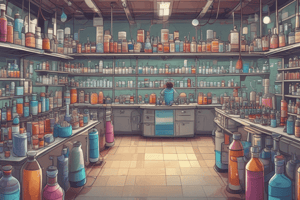Podcast
Questions and Answers
What does pharmaceutical manufacturing refer to?
What does pharmaceutical manufacturing refer to?
- Producing drugs in a controlled environment (correct)
- Marketing drugs to consumers
- Regulating drug prices
- Testing the efficacy of drugs
What is the purpose of the formulation development stage in pharmaceutical manufacturing?
What is the purpose of the formulation development stage in pharmaceutical manufacturing?
- To package the final product
- To test the drug product
- To select the active ingredients and formulating the drug product (correct)
- To market the drug product to consumers
What role does quality control play in drug production?
What role does quality control play in drug production?
- Testing the efficacy of drugs
- Regulating drug prices
- Packaging and labeling the final product
- Ensuring the final product meets required standards and specifications (correct)
What is the final step in pharmaceutical manufacturing?
What is the final step in pharmaceutical manufacturing?
What is the primary goal of drug production?
What is the primary goal of drug production?
What is the primary purpose of conducting preclinical testing in the drug development process?
What is the primary purpose of conducting preclinical testing in the drug development process?
How does biopharmaceutical production differ from traditional pharmaceutical manufacturing?
How does biopharmaceutical production differ from traditional pharmaceutical manufacturing?
What is a key aspect of regulatory compliance in drug production?
What is a key aspect of regulatory compliance in drug production?
What is the purpose of downstream processing in biopharmaceutical production?
What is the purpose of downstream processing in biopharmaceutical production?
In drug development, what is the significance of continuous monitoring in regulatory compliance?
In drug development, what is the significance of continuous monitoring in regulatory compliance?
Flashcards are hidden until you start studying
Study Notes
Drug Production: Pharmaceutical Manufacturing, Quality Control, Regulatory Compliance, and Drug Development
Drug production is a complex process that involves various stages from pharmaceutical manufacturing to drug development. This article provides an in-depth exploration of drug production, focusing on the subtopics of pharmaceutical manufacturing, quality control, regulatory compliance, and drug development, as well as the role of biopharmaceutical production in the industry.
Pharmaceutical Manufacturing
Pharmaceutical manufacturing refers to the process of producing drugs in a controlled environment to ensure quality, safety, and efficacy. This process involves several steps, including formulation development, production, testing, and packaging.
-
Formulation Development: This stage involves selecting the active ingredients, excipients, and formulating the drug product to achieve the desired therapeutic effect.
-
Production: The selected active ingredients and excipients are combined, processed, and formulated to create the drug product.
-
Testing: The drug product undergoes various tests to ensure it meets quality standards and regulations.
-
Packaging: The final product is packaged and labeled according to regulatory requirements.
Quality Control
Quality control is a crucial aspect of drug production, ensuring that the final product meets the required standards and specifications. This process involves various steps, such as:
-
Raw Materials: Ensuring that the raw materials used in drug production are of high quality and meet the required specifications.
-
Manufacturing Process: Monitoring and controlling the manufacturing process to ensure consistency and quality.
-
Packaging and Labeling: Ensuring that the packaging and labeling meet regulatory requirements and protect the product during storage and transportation.
-
Testing: Conducting various tests on the final product to ensure its quality, safety, and efficacy.
Regulatory Compliance
Regulatory compliance is a crucial aspect of drug production, as it ensures that the final product meets the required standards and regulations. This process involves:
-
Regulatory Framework: Understanding and adhering to the regulatory framework, which includes guidelines for good manufacturing practices (GMP), good laboratory practices (GLP), and good clinical practices (GCP).
-
Quality Management System: Implementing a quality management system that complies with the regulatory framework and ensures the quality of the final product.
-
Continuous Monitoring: Regularly monitoring and updating the quality management system to ensure compliance with the regulatory framework.
Drug Development
Drug development is the process of discovering, developing, and bringing a new drug to market. This process involves several stages, including:
-
Research and Development: This stage involves discovering new drugs, conducting research, and developing a drug product.
-
Preclinical Testing: Preclinical testing is conducted on animals to assess the safety and efficacy of the drug product.
-
Clinical Trials: Clinical trials are conducted on human subjects to assess the safety and efficacy of the drug product.
-
Regulatory Approval: The drug product is submitted to regulatory agencies for approval, based on the results of the preclinical and clinical trials.
-
Market Authorization: Once the drug product is approved, it is authorized for sale and distribution in the market.
Biopharmaceutical Production
Biopharmaceutical production involves the use of living organisms or cells to produce drugs, such as proteins, vaccines, and gene therapies. This process is more complex than traditional pharmaceutical manufacturing, as it involves:
-
Cell Culture: Culturing cells to produce the desired proteins or vaccines.
-
Downstream Processing: Separating and purifying the desired proteins or vaccines from the cell culture.
-
Quality Control: Ensuring that the final product meets the required quality standards and regulations.
Biopharmaceutical production has been revolutionizing the drug industry, as it enables the production of complex drugs that were previously difficult or impossible to produce using traditional methods.
In conclusion, drug production is a complex process that involves pharmaceutical manufacturing, quality control, regulatory compliance, drug development, and biopharmaceutical production. Each of these subtopics plays a crucial role in ensuring the quality, safety, and efficacy of the final drug product. As the drug industry continues to evolve, these processes and their importance will only grow.
Studying That Suits You
Use AI to generate personalized quizzes and flashcards to suit your learning preferences.




